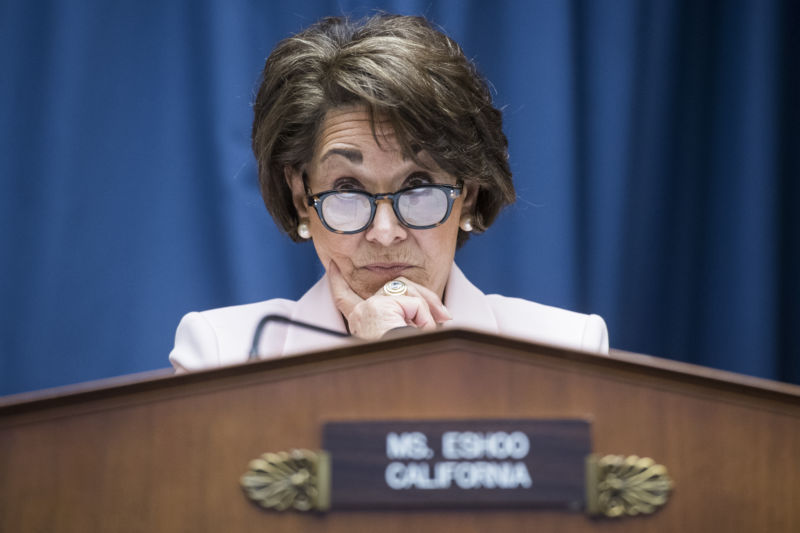
Congress is taking one more stab at addressing the near-complete lack of federal legal guidelines overlaying the completely large trove of knowledge that firms now gather on each one in every of us, which kinds the spine of mainly the whole big tech period.
Representatives Anna Eshoo and Zoe Lofgren, each Democrats from California, launched the On-line Privateness Act at the moment. The act would create a brand new federal company, the Digital Privateness Company, to implement privateness rights. The act would additionally authorize the company to rent as much as 1,600 staff.
"Each American is susceptible to privateness violations with few instruments to defend themselves. Too typically, our personal info on-line is stolen, abused, used for revenue, or grossly mishandled," Eshoo mentioned in an announcement. "Our laws ensures that each American has management over their very own knowledge, firms are held accountable, and the federal government gives robust however truthful oversight."
"Our nation urgently wants a authorized framework to guard customers from the ever-growing data-collection and data-sharing industries that make billions yearly off Individuals' private info," Rep. Lofgren added. "Privateness for on-line customers has been nonexistent—and we have to give customers management of their private knowledge by making reputable adjustments to enterprise practices."
The On-line Privateness Act
The provisions within the invoice (PDF) would apply to "any entity (together with nonprofits and customary carriers) that deliberately collects, processes, or maintains private info AND transmits private info over an digital community."
Underneath the phrases of the OPA, people would have the appropriate to acquire, appropriate, and delete knowledge collected about them by coated entities, in addition to to request "a human evaluate" of automated choices. Customers would additionally must opt-in to having their private knowledge used for coaching machine studying algorithms. They might be capable to select for the way lengthy firms retain their knowledge.
The invoice distinguishes between aggregated knowledge and private, identifiable knowledge that's tied to an individual, and it locations robust limitations on use of the latter. As outlined in a one-page truth sheet, the OPA would:
- articulate the necessity for and reduce the consumer knowledge [covered entities] gather, course of, disclose, and preserve
- reduce worker and contractor entry to consumer knowledge
- not disclose or promote private info with out specific consent
- not use third-party knowledge to reidentify people
- not use personal communications, (e.g., emails and Net site visitors) for adverts or different invasive functions
- not course of knowledge in a means that violates civil rights, e.g., employment discrimination
- solely course of genetic info in restricted circumstances
- use objectively comprehensible privateness insurance policies and consent processes, and should not use 'darkish patterns' to acquire consent
- make use of affordable cybersecurity insurance policies to guard consumer knowledge, and
- notify the company and customers of breaches and data-sharing abuses, e.g., Cambridge Analytica
The privateness mess
Privateness regulation in america at the moment is a patchwork of regulation, and the top result's mainly a scorching mess that leaves companies with limited authority to research and penalize even egregious abuses of non-public knowledge.
The federal statutes that exist every cowl a particular, restricted type of knowledge and enumerate a particular, restricted type of entity that is obligated to guard that knowledge. So for instance, whereas your physician's workplace cannot promote details about your diagnoses to a 3rd get together, no such limitation applies to apps or wearable gadgets that gather the identical sorts of knowledge.
A handful of states have further legal guidelines on the books. Illinois, for instance, adopted a prescient regulation again in 2008 that regulates the gathering and use of people' biometric knowledge. Fb since 2015 has been embroiled in a class-action lawsuit in that state over its use of facial recognition.
The largest participant on the state stage is California, which in 2018 adopted a sweeping privacy law that will give people extra management over how their private knowledge is collected, used, and offered. That regulation has survived several attempts by opponents to weaken its key provisions, and it goes into impact on January 1.
Representatives Eshoo and Lofgren are removed from the primary to suggest new federal laws to deal with the morass. In truth, they are not even the primary this 12 months. Sen. Ron Wyden (D-Ore.) final month launched the Mind Your Own Business Act, which not solely seeks to introduce new requirements for consumer privateness and the way knowledge is dealt with, however would additionally impose prison penalties, together with jail time, on the management of firms that fail to conform.
Sen. Marco Rubio (R-Fla.) additionally launched a privacy-related invoice earlier this 12 months. His American Data Dissemination Act would create a course of and timeline for the Federal Commerce Fee to ascertain privateness guidelines, reasonably than really establishing new guidelines. It will additionally prohibit any state from implementing its personal regulation associated to the identical sorts of knowledge because the federal regulation, one thing many massive tech firms strongly support.
